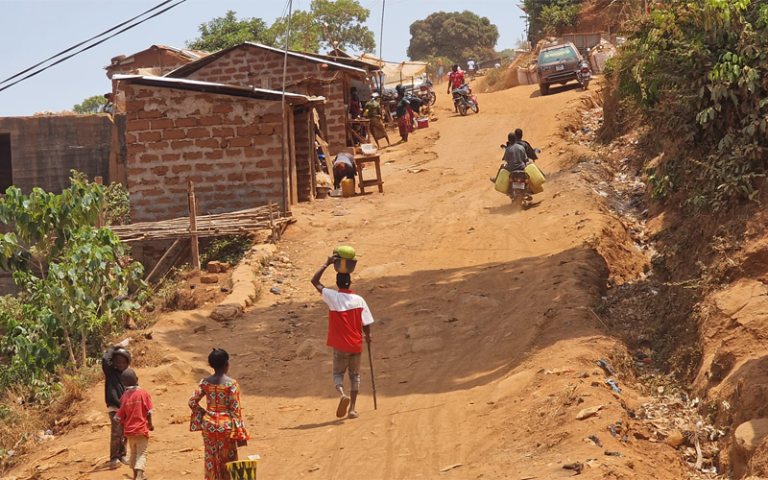Walking in unwalkable cities in Africa
Dr Daniel Oviedo (UCL Bartlett) used UCL-Osaka University Strategic Partner Funds to research the walking conditions in African cities where walking is the main mode of transport.

1 July 2023
For people who live in the informal neighbourhoods of African cities, walking is often the main mode of transport. Whether it’s to use public facilities or to reach employment, a large proportion of people walk to fulfil their daily needs. Yet in many African cities, particularly in the informal settlements, there is little or no infrastructure set up to accommodate so many people walking.
In response to this, Dr Daniel Oviedo collaborated with Professor Michihiro Kita from Osaka University, to set up the UCL-Osaka Walking Cities Lab. Initially, they secured funding from Osaka University to develop a framework for mapping and measuring the experiences of walking in Freetown, Sierra Leone. Following on from the success of this, they received UCL-Osaka University Strategic Partner Funds to continue expanding the work of the lab, which included using their framework in Accra, Ghana.
Discovering the reality of walking in African cities
“Academic research about walking in Africa is almost non-existent,” Daniel said. “Yet in the informal neighbourhoods we’ve been working in in Sierra Leone and Ghana, the only choice at least 70% of inhabitants have is walking. So you have a majority of people whose only choice to access their livelihoods and opportunities is walking. But their environments are not walkable: there is no infrastructure or provision.”
The framework Daniel and his colleagues developed looks at various aspects of the unwalkable environments people are walking in. One finding from the research was that people who walk in these environments take it upon themselves to improve their walking environments. “Through self-help and innovation, we found people in Freetown and Accra transform their walking environments,” Daniel said. “They add street lights, bridges and canals for managing drain water, so the pathways don't get flooded. In the case of Freetown, which is a hilly community, people have built stairs. They are essentially adding to their local environments so they can walk across a neighbourhood.”
In Accra, the team also explored if there was a difference in the way communities come together closer to or further away from the city centre. Closer to the city centre and thus to economic activity, there were more practical interventions for improving the walking environment. Further away from the city centre, communities had come together more for beautification purposes, creating green spaces, and adding benches and resting spots.
Daniel and the team also found that the dominant academic literature that relates to walking in Africa doesn’t take into account the reality of life for many inhabitants. “There is a damning narrative around walking in Africa that says it is only something that is dangerous due to traffic and pollution,” Daniel said. “There’s a very negative perception. Yet walking is the precondition for every other basic necessity. If you need to access a public toilet, or go to the market, you need to walk. And actually, children tend to walk to school together, because it’s either dangerous or unaffordable to take a motorcycle taxi, or another form of motorized transport.”
Making walking in Africa an area of research
The continuing research and work of the UCL-Osaka Walking Cities Lab is having a number of knock-on effects. One area of impact is increasing knowledge among communities about specific walking conditions, and locations where interventions are most needed. “We have printed a number of maps we produced through the course of our research, and pinned them up in community centres and other prominent places,” Daniel said. “These maps show the interventions the local communities have made, so when NGOs or city councils come in to do work in these communities, they know where to focus any funding that becomes available.”
The value of the research has also enabled the team to secure more funding to continue their work, including some from the Volvo Research and Educational Foundations (VREF), which is running the ‘Walking as a Mode of Transport’ project. The Osaka team has also secured funding to apply a similar framework to school based developments, looking at how people transform their environment to support children. As well as this, the team has been able to add more staff to the UCL-Osaka Walking Cities Lab, including research assistants and academics in Ghana. This is all helping to improve capacity and nurture the next generation of scholars interested in issues relating to Africa. “Our objective with setting up the lab is at some point to pass it over to our African colleagues,” Daniel said. “We are generating replicable methodologies that African researchers can take forward, hopefully making this an area of research in its own right.”
Daniel says one of the most valuable aspects of gaining the funding to do this work is the connections and collaborations it has enabled with colleagues in Japan and across Africa. “We have different points of entry to similar issues, and the different perspectives have enriched our work incredibly,” Daniel said. “It’s given the project a unique flavour, and it wouldn’t have been possible without UCL’s strategic alliance with Osaka University. Added to this, it’s very gratifying to be awarded joint funding for work that is not happening in either the UK or Japan. It doesn't look at the countries where we are based, but rather, it serves as a platform for bringing in other researchers from all parts of the world.”
Links
- Walking Cities Lab
- Walking off the beaten path: Everyday walking environment and practices in informal settlements in Freetown
- Research in Transportation Business and Management
- Walking as a Mode of Transport, VREF
- Apply to UCL-Osaka University Strategic Partner Funds 2023/24
- UCL-Osaka University Strategic Partner Funds 2021/22 recipients
- UCL in East Asia
- UCL in Africa & Middle East
 Close
Close

